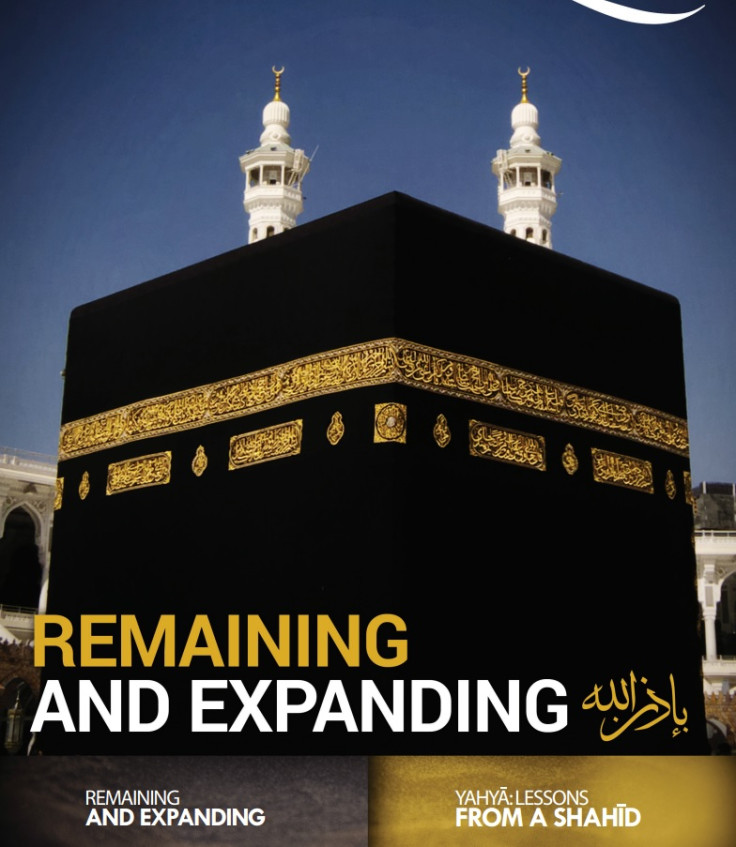Isis Propaganda Mag Dabiq: Jerusalem and Saudi Arabia Threatened While Setbacks Concealed

The Islamic State (Isis) threatened to attack Jerusalem and Saudi Arabia in a new issue of its official magazine, Dabiq.
However, beyond the veil of propaganda, the publication seemed more concerned with spurring and reassuring Islamist fighters, after a recent series of military setbacks.
The front cover of the English language magazine's fifth issue featured a picture of Islam's holiest site, the Masjid al-Haram, or the Grand Mosque, in the Saudi city of Mecca, with a pledge to seize it.
In an introductory article titled Forward, the self-styled Caliphate vowed to also extend its reach to Islam's second and third holiest sites - respectively the Masjid Al-Nabawi in Medina, Saudi Arabia, and the Al-Aqsa Mosque in Jerusalem.
"The flag of Khilafah [Caliphate] will rise over Mecca and Medina even if the apostates and hypocrites despise such," the article reads.
"The flag of Khilafah will rise over Baytul-Maqdis [the Al-Aqsa Mosque] and Rome, even if the Jews and Crusaders despise such.
"The shade of this blessed flag will expand until it covers all eastern and western extents of the Earth, filling the world with the truth and justice of Islam," the article continued.
Rome and the Vatican have been already threatened in Dabiq's previous issue, which had a photoshopped picture of a jihadi flag flying atop the Holy See on the front cover.
The Al-Aqsa compound, also known as Temple Mount, has been at the centre of Palestinian unrest in recent weeks, following proposals to enhance access for Jews, who are currently banned from praying there.
Islamic State's new propagandist threats came weeks after the group's leader Abu Bakr al-Baghdadi called for attacks against the Saudi rulers, Shi'ite Muslims and westerners in an audio message.
In the recording, Baghdadi attempted to close the jihadi ranks, saying that his fighters "will never leave fighting," and the magazines seemed to be attempting to serve the same purpose.
The leading article, titled Remaining and Expanding, placed particular emphasis on the first of the two aspects, with a dedicated paragraph: The Islamic State is Here to Stay.
The piece gave ample space to pledges of alliance by other Islamist groups across the world, but little to the current situation in Iraq and Syria.
Only a few paragraphs were dedicated to fighting in Iraq's Anbar province and in northern Syria, with particular focus on the flashpoint Kurdish city of Kobane.
The reports cited no victories, stressing that "in spite of the heavy bombardment ... the mujahidin have refused to retreat."
The Sunni extremists are facing significant pressure both in Syria and Iraq following the launch of a US-led aerial campaign against them.
Earlier this week, Iraqi officials said government forces have gained ground in the battle for Ramadi, the capital of Anbar.
Iraqi Kurdish Peshmerga forces have also wrestled back control of the northern towns of Jalula and Sadia, according to the Washington-based Institute for the Study of War (ISW), while, days earlier, Iraqi security forces freed the country's largest oil refinery in Baiji.
Some of the Islamic State's senior leaders, including a chief aide to Baghdadi, have been killed in air strikes.
Nevertheless, at least on paper, the group claimed it is growing stronger and more defiant.
"With every kafir [infidel] that is enlisted to fight the Islamic State, every bomb that is dropped onto the homes of its people, every lie that is circulated against it by the international media, and every coin that is spent to try to halt its advance, the Khilāfah and its mujahidin only grow stronger, more determined and more defiant," the magazine reads.
© Copyright IBTimes 2024. All rights reserved.






